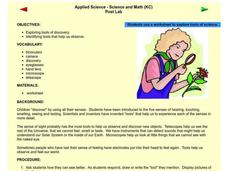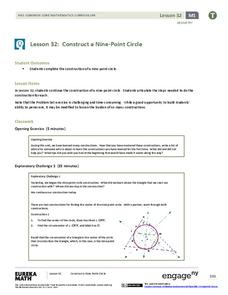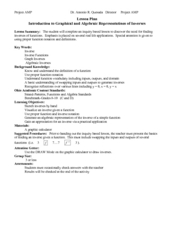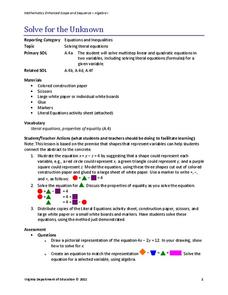Curated OER
Analyzing the Job Market for Babysitting in Your Neighborhood
Young scholars conduct research on a neighborhood in Canada. In this data analysis lesson, students use data from the 2006 Canadian census to draw conclusions about a population group.
Curated OER
Mathematics Lesson for Grade 12
Twelfth graders examine multiple aspects of statistics. In this mathematical reasoning lesson, 12th graders solve problems on probability, logarithms, exponential relationships and transforming rectilinear shapes. This resource contains...
Curated OER
Introductory Lesson- Patterns
First graders explore patterns in mathematical context. In this patterns instructional activity, 1st graders inspect patterns shown to them, copy patterns, complete patterns and create patterns of their own. These patterns are shown by...
Curated OER
2-D and 3-D Presents at Pedro's Party
Fifth graders draw 2-D and 3-D shapes. They sketch and label geometric figures with correct terminology, then explore parallel and perpendicular lines. Pupils sort and classify shapes drawn.
Curated OER
The Real Number System
Learners analyze the real number system. They discuss real numbers, rational and irrational numbers, integers, whole numbers, natural numbers and more of the real number in the system. They differentiate between all these numbers.
Curated OER
Telling Time: Two Ways to Read the Time
Second graders discuss the two different ways of reading time. They study the vocabulary "minutes to" and tell time in five minute intervals. They discuss why it is important to have schedules and students list some schedules that they...
Curated OER
Draw It!
Young scholars follow directions to make two- and three-dimensional shapes. Focusing on polygons, they use the shapes to solve real-world problems and review with the class. They read two of Shel Silverstein's poems and discuss the...
Curated OER
Applied Science - Science and Math Post-Lab
Students use scientific tools. In this Applied Science lesson plan, students investigate the use of scientific tools to enhance observation and discovery. Students indicate how each tool assists scientific work.
EngageNY
Construct a Nine-Point Circle
There are an infinite number of points on a circle; can you find nine of them? After putting together a nine-point circle, pupils use constructions and their knowledge of triangle segments to determine the center of the circle. Learners...
Scholastic
Math Word Problems
After reading The Mitten by Jan Brett, youngsters willuse the characters in the story to write word problems for addition and subtraction. For example, they may state that a rabbit had 7 carrots and then lost 2, how many were left? There...
Curated OER
Build a Burger
Here is an outstanding lesson on food groups, nutrition, and diet. In it, learners focus on hamburgers! They take a close look at the products that go into making a hamburger, conduct taste tests on samples, discuss the nutritional value...
Curated OER
Adjective Monster
Explore descriptive writing and visual art. Listen to the story Go Away Big, Green Monster by Ed Emberley and generate a list of adjectives used in the book. Name familiar shapes and create a shapes list. Choose an adjective and shape to...
Virginia Department of Education
Probability
Classes explore different scenarios using manipulatives to learn about the difference between independent and dependent probability. Learners experiment with colored chips to model the two types of probabilities. To test their...
Curated OER
Angles
Fifth graders identify different angles according to its type that is determined according to taking a measurement of the degree. They also explore the vocabulary related to the concept.
Virginia Department of Education
Multiplying Polynomials Using Algebra Tiles
Tiles are not just for algebra—see how they can help with multiplication too. Young mathematicians learn to use algebra tiles to model the multiplication of polynomials. A follow-up worksheet provides practice with the skill.
Virginia Department of Education
Adding and Subtracting Polynomials Using Algebra Tiles
Scholars learn how using algebra tiles to add and subtract polynomials can model how to combine polynomials. They use their newfound knowledge to complete a worksheet of problems.
Virginia Department of Education
Properties of Quadrilaterals
What type of quadrilateral is that? Discover the difference between the types of quadrilaterals. Small groups investigate types of quadrilaterals using geometry software to find their properties. To keep track of the different...
Curated OER
Stem-and-Leaf Plots
Seventh graders study steam-and-leaf plots. Given specific data, they create a stem-and-leaf plot . Students identify the mean, mode, range and median. Afterward, they review vocabulary words.
Curated OER
Linear Inequalities
Ninth graders explore solving linear inequalities. They discuss vocabulary words and symbols associated with linear inequalities. After a demonstration by the teacher, 9th graders solve and graph inequalities. Students complete a...
Virginia Department of Education
Constructions
Pupils learn the steps for basic constructions using a straightedge, a compass, and a pencil. Pairs develop the skills to copy a segment and an angle, bisect a segment and an angle, and construct parallel and perpendicular lines.
Curated OER
Algebra/Geometry Institute Summer 2007: Graphing Activity
Seventh graders practice identifying coordinates by examining a city map. In this graphing lesson, 7th graders create coordinate directions on an index card and practice locating these locations on a grid. Students read and...
Curated OER
Introduction to Graphical and Algebraic Inverses
Solve inverse functions through graphing and algebra. High schoolers will graph inverse functions and use the correct notation to write the equation. They observe a graph and write an equation for the function. In the end, they will be...
Virginia Department of Education
Quadratic Curve of Best Fit
Class members create a table of the number of chords that can be drawn given the number of points on a circle. Pupils analyze the data created, find a function to fit to it, and use the function to make further predictions.
Virginia Department of Education
Solve for the Unknown
How can shapes help solve literal equations? Scholars first learn to replace variables with shapes to aid in solving literal equations. A worksheet of practice problems helps hone the skill.























